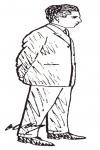Biography
Kostas Karyotakis ( October 30, 1896 - July 20, 1928) is considered one of the most representative Greek poets of the 1920s and one of the first poets to use iconoclastic themes in Greece. His poetry conveys a great deal of nature, imagery and traces of expressionism and surrealism. The majority of Karyotakis' contemporaries viewed him in a dim light throughout his lifetime without a pragmatic accountability for their contemptuous views; for after his suicide,the majority began to revert to the view that he was indeed a great poet. He had a significant, almost disproportionately progressive influence on later Greek poets.
In February 1919 he published his first collection of poetry: The Pain of Men and Things , which was largely ignored or badly criticized by the critics. In the same year he published with his friend Agis Levendis a satirical review called The Leg, which despite its success was banned by the police after the sixth issue. In 1921 he published his second collection called Nepenthe (Greek: Νηπενθῆ) and also wrote a musical revue Pell-Mell. In 1922 he began having an affair with the poet Maria Polydouri who was a colleague of his at the Prefecture of Attica.
In 1923 he wrote a poem called "Treponema pallidum" , which was published under the title "Song of Madness" and gave rise to speculation that he may have been suffering from syphilis, which before 1945 was considered a chronic illness with no proved cure for it. George Skouras, a physician of the poet, wrote: "He was sick, he was syphilitic" and George Savidis (1929-1999), professor of the Aristotle University of Thessaloniki, who possessed the largest archive about Greek poets, revealed that Karyotakis was syphilitic, and that his brother, Thanasis Karyotakis, thought the disease to be a disgrace to the family.
In 1924 he traveled abroad, visiting Italy and Germany. In December 1927 he published his last collection of poetry: Elegy and Satires . In February 1928, Karyotakis was transferred to Patras although soon afterwards he spent a month on leave in Paris and in June 1928 he was sent yet again to Preveza. From there he sent desperate letters to friends and relatives describing the misery he felt in the town. His family offered to support him for an indefinite stay in Paris, but he refused knowing what a monetary sacrifice like this would entail for them. His angst is felt in the poem "Preveza" which he wrote shortly before his suicide. The poem displays an insistent, lilting anaphora on the word Death, which stands at the beginning of several lines and sentences. It is shot through with a pungent awareness of the gallows, in the tiny mediocrity of life as Karyotakis felt it, mortality is measured against insignificant, black, pecking birds, or the town policeman checking a disputed weight, or identified with futile street names (boasting the date of battles), or the brass band on Sunday, a trifling sum of cash in a bank book, the flowers on a balcony, a teacher reading his newspaper, the prefect coming in by ferry: "If only," mutters the last of these six symmetrical quatrains, "one of those men would fall dead out of disgust." ..






